Birgit Nilsson Interview with Bruce Duffie . . . . . (original) (raw)
BIRGIT NILSSON - A CELEBRATION
By Bruce Duffie
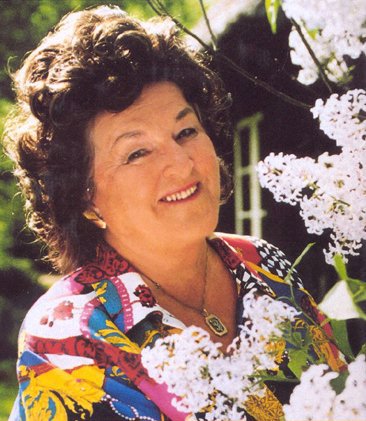
What can one say about a legend? Surely, Birgit Nilsson qualifies for that title. In the highly competitive world of operatic performance, she attained the pinnacles of dramatic and vocal art, and despite not enjoying her own recordings, there is a legacy for us to enjoy and for future audiences to appreciate.
Marta Birgit Svennsson was born five days before Wagner's birthday in 1918, and lived until Christmas Day, 2005. She was heard by a local choirmaster and advised to study singing, which she did at the Royal Academy of Music in Stockholm. As she herself notes, she sang practically everything, and learned her craft well. It was in 1954 that she was first heard in Vienna, and began her long association with the Festival at Bayreuth. Her American debut was at the Hollywood Bowl in 1956 followed by _Die Walküre_in San Francisco and then in Chicago conducted by Solti. She sang the _Ring_in London in 1957, and made that famous debut at the Met in 1959.
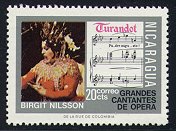 It was apparent from the start of her international career that Wagner and Strauss would be the major focus of her time and talents, but she also continued to sing roles in Verdi Operas, as well as being the most noted Turandot of the period. She traveled all around the world presenting these long and demanding parts to enthusiastic audiences, and setting a standard which will be revered for many generations.
It was apparent from the start of her international career that Wagner and Strauss would be the major focus of her time and talents, but she also continued to sing roles in Verdi Operas, as well as being the most noted Turandot of the period. She traveled all around the world presenting these long and demanding parts to enthusiastic audiences, and setting a standard which will be revered for many generations.
These days, as she told me, she likes to decide what to do with her free time. "I do some master classes when I feel like it, but I don't have any regular students. I enjoy teaching, but I don't want to tie myself down too much. I like to enjoy life, too." With all that in mind, it was a great pleasure to have a chance to speak with Birgit Nilsson during her tour of the US as part of the celebrations of the 350th anniversary of the founding of the first Swedish settlements on these shores. There were galas in several cities, and she even took the time for a few master classes along the way. It was after one of those teaching sessions that I caught up with her, and we began our conversation with a discussion of those young voices she had just heard . . . . .
Bruce Duffie: What do you look for in young voices?
Birgit Nilsson: I try to help them on the way of singing as beautiful as possible with a secure technique. I take what I have and try to do the best with that because they need a lot of advice. I cannot look for the same particular thing in every voice. We are all unique, so there are not two voices that sound alike. That is wonderful because it's a challenge to work with so many different voices. You never find two voices which are similar.
BD: Is there anyone problem that keeps cropping up in many of the youngsters?
BN: I always say to my students, “I want to bake the cake before I decorate it.” Most of the time the breathing is not right, they don't support correctly. They don't use the resonant room that we have in our foreheads and at the sides of the nose. I work like they did in Italy many many years ago to get the tone produced “in the mask” because that is the only way to get the right sound. That is our violin case, our piano case, and that has to sound. If you pass those areas, the voice either gets dark or heavy, or it might sound very big in one’s own head but it doesn't project. If you have the voice placed correctly, far up in the head in those resonant rooms (as I call them), then you can start working on expressions, dynamics, and everything else.
BD: Once you get this technique set in a young singer, does the voice itself dictate which roles it should sing- heavy or light, long or short?
BN: It depends on their age and the kind of voice. It is hard to tell. It has to be very individual. You have to judge every student differently. Some singers will only be able to sing secondary roles, and some, hopefully, will be able to sing the leading roles.
BD: Thinking back on your own career, how did you decide which roles you would accept, and which ones you would postpone or even decline?
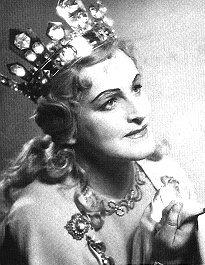 BN: I was not so lucky by deciding myself. I was at the Stockholm Opera House, and when they were short of dramatic singers, I just had to do what they told me. Sometimes people were afraid I was overworked, and it was not the right way to handle a young voice, but as I say, if you survive you get strong, or you die. There are only those two ways.
BN: I was not so lucky by deciding myself. I was at the Stockholm Opera House, and when they were short of dramatic singers, I just had to do what they told me. Sometimes people were afraid I was overworked, and it was not the right way to handle a young voice, but as I say, if you survive you get strong, or you die. There are only those two ways.
[Photo at left: As Elizabeth in _Tannhäuser_in 1953]
BD: Are there too many singers today who are dying?
BN: Too many. yes.
BD: Is there any way to prevent their demise?
BN: I guess not, because it is very, very difficult nowadays. We are living a hectic life. Everyone wants to make a career after one or two years, and if they are young and good looking, the conductors and managers try to ruin them as much as possible. If one conductor or manager gets interested in a voice, then everyone wants that singer. You see, most of the conductors and managers in opera don't trust themselves because they don't have good ears. So, it's a very strange business. If one singer is told he or she is good, the whole world wants to use that voice, which is very bad for the voice. It's too much.
BD: Well, are we having any success in convincing the younger singers to slow down a bit?
BN: There are some who are sensible, but most are not. And I don't blame them because it is their career and they are eager to go on and they think each offer will be their only chance. There are many who don't listen, and they think they will be the one to make it. Sometimes they are that rare artist, but most of the time not. Also, the voice cannot grow in volume if you are constantly singing and working and getting tired. You have to recuperate and let it grow. Not so much for the lighter voices, but real dramatic voices in. any category - soprano, mezzo, baritone, whatever - are not fully developed at 30. They even grow further. If you work too much in your 20's, the voice will never grow to the right size.
BD: So each individual voice must be paced throughout the career?
BN: Ah yes. Yes, yes. Absolutely. But one is impatient when one is young. I was that myself, so I understand it very well. I would rather blame the managers and conductors for taking the wrong singers for the wrong roles.
BD: Well, what advice, then, do you have for managers of opera houses, or personal managers?
 BN: There is little that one can say. They are looking for success and are trying to do something special. I was asked about a young singer for the role of Brünnhilde and I said that she was not ready yet and advised them to wait, but they said they had no time to wait, it must be now. I asked this man what happens when the singer ruins her voice, and he said, "So what? Then we take another when she's finished."
BN: There is little that one can say. They are looking for success and are trying to do something special. I was asked about a young singer for the role of Brünnhilde and I said that she was not ready yet and advised them to wait, but they said they had no time to wait, it must be now. I asked this man what happens when the singer ruins her voice, and he said, "So what? Then we take another when she's finished."
BD: Like picking fruit off a tree.
BN: Yeah. But that is the way it goes. It's a dangerous thing.
BD: OK, when should the voice start assuming the very heavy roles - the Brünnhildes and the Tristans?
BN: It's all individual. It depends how solid, how well schooled the voice is. It doesn't always depend on how big it is. The technique has to be secure. I don't like to put an age to it, but between 35 and 40 is probably the right time to start with the big roles. Generally that's right, but there are those who can start earlier. But without a solid technique, they should never start those roles. . . (laughter)
BD: I assume that if a singer should wait until the late 30's to start the big roles, he or she should be doing other things before that.
BN: Sure, more lyric parts as long as the voice grows, and the voice will grow with every part they sing. This is if the roles suit the voice. Some are more dramatic very young. I was working the other night with a young singer who is only 22 but her voice is so big she can hardly handle it. It is frightening .She is very intelligent, but she's gotten many compliments on how big the voice is, and she had better learn to handle it now and sing some Mozart. I made her promise me that every morning before she sang anything else, she'd do "Porgi Amor" from The Marriage of Figaro. That aria of the Countess has a slender line and she has to slenderize her voice. A voice teacher can only do so much. The singer must do the rest and the teacher can only listen while the students sometimes think they know better.
BD: Well, are there some great voices coming along today?
BN: I have heard a few, yes. But it is a matter of luck, also. It is so hard to get started. As I said, managers don't trust their own ears, and they want some sort of a guarantee. There are very few who will take a youngster and work with him or her and help make the career. There are too many trying to sing and there is no place for all of them. And some managers look with an eye to the television and how a singer will appear beside another good-looking one. They take a little lyric soprano for a dramatic part because she will look more slender. The bigger voices need to have more robust figures, and that is not very much appreciated these days. I don't mean that singers should be overly fat, but they should not try to look like a coloratura and sing like a dramatic.
* * * * *
BD: In looking at your own career, do you feel you are part of a lineage of singers?
BN: I never think of that. I am one of the singers who tries to do as well as possible. That's all. Other people can line me up as much as they want to. (laughter)
BD: Were there any roles that you wanted to sing but never got around to?
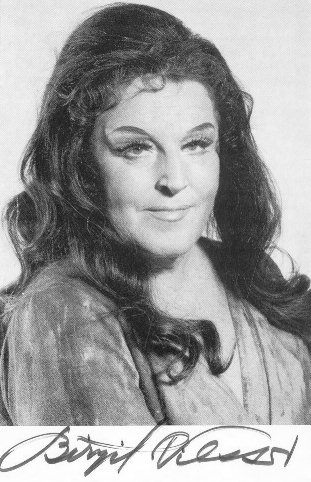 BN: Really not. I had to be convinced every time a new role was offered. I didn't have too much self-confidence. I felt the other roles had gone very well and I didn't want to risk being a flop in the new one. It was very hard for people to get me to do new roles. At my last new role in Die Frau Ohne Schatten in Stockholm, I went there for the rehearsals with every intention of canceling. I had worked on the part and thought I could never do it, so I went there to tell them I would not sing it. When I got there, the manager said to me, "Oh how wonderful you are to be here, you are so reliable. Can you believe it? Our baritone has canceled! He had the nerve to cancel with just three weeks before the premiere!" I was going to do the same thing, but I didn't dare to. I figured that I would do a few orchestra rehearsals and everyone will know that I cannot sing it. But I was carried by the orchestra in a way that I never dreamt of. Rehearsing that opera with only a piano was impossible, but with Orchestra everything was just fine. So I was glad I didn’t cancel it, but it was very close.
BN: Really not. I had to be convinced every time a new role was offered. I didn't have too much self-confidence. I felt the other roles had gone very well and I didn't want to risk being a flop in the new one. It was very hard for people to get me to do new roles. At my last new role in Die Frau Ohne Schatten in Stockholm, I went there for the rehearsals with every intention of canceling. I had worked on the part and thought I could never do it, so I went there to tell them I would not sing it. When I got there, the manager said to me, "Oh how wonderful you are to be here, you are so reliable. Can you believe it? Our baritone has canceled! He had the nerve to cancel with just three weeks before the premiere!" I was going to do the same thing, but I didn't dare to. I figured that I would do a few orchestra rehearsals and everyone will know that I cannot sing it. But I was carried by the orchestra in a way that I never dreamt of. Rehearsing that opera with only a piano was impossible, but with Orchestra everything was just fine. So I was glad I didn’t cancel it, but it was very close.
[Photo at left: In _Die Frau Ohne Schatten_]
BD: Were you ever surprised by the amount of success you had?
BN: Sometimes, yes. It's very hard to tell how good or bad one is when it's yourself. You want, of course, to be good, but it's not sure that you can achieve what you want. I was very, very surprised at my debut at the Metropolitan. I'd been told that another soprano had received an ovation after the "curse” in the first act, and when that didn't happen on my first night, I really thought I'd failed. I almost lost my confidence, but I had to sing to the end of that 78 minute act. But when it was over, my God, there was screaming and applause. It was unbelievable, but I was surprised because I didn't get the applause in the middle. And when I arrived in New York, I received a call from a man who said he was going to listen to my Isolde and he was going to applaud. I asked how he could say such a thing before having heard me, and he said he was the head of the claque and I would be paying for the applause. Well, I told him thank you very much, but when I have to pay for applause I will stop singing, and hung up the phone.
BD: How are the audiences similar or different in various cities around the world?
BN: They are very much alike if something is good. Sometimes it seems that the more elegant the public, the colder they are! They are so busy with their own dress and so on. The one you must put aside is Teatro Colon in Buenos Aires. They almost kill you with kindness! It's almost frightening. They almost rip your clothes away when you come out after a performance if you've been good.
BD: Are the acoustics in that theater as good as they say?
BN: It's wonderful, yes. It's a big house - 3500 people - but it's so spacious that you can sit with your legs stretched out and people can still pass in the rows in the orchestra. It could easily seat 5000.
BD: Do you sing better when you have better or more exciting colleagues to work with?
BN: Oh sure. It's wonderful when we inspire each other. The better they are, the better one is oneself. It's terrible having someone who is not very good. It's hard work when you see that you have to carry the whole thing yourself. I've been often unlucky with tenors - especially in Tristan. It's not every day that I had a Jon Vickers or a Jess Thomas. I had many others who were weak. [Note: See my interview with Jon Vickers for similar statements from him about Nilsson, and a photo of them together.]
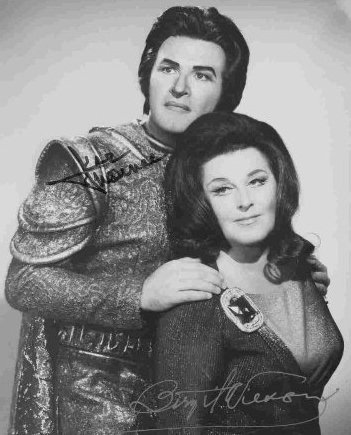
[Nilsson with Jess Thomas in _Tristan und Isolde_]
BD: When you had a tenor who was, perhaps, very expressive but simply didn't have a huge sound, did you tone your own voice down a bit to match his?
BN: When one sings duets, if one is musical it goes automatically. I never think about it, but you must blend somehow. And if you are with someone who has a very big voice and he's singing in your ear, you cannot hear yourself and you have to scream back. (laughter)
BD: What about recordings - do you adjust your technique for the microphone?
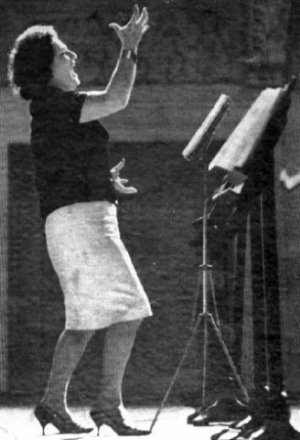 BN: I wish I could have, but it's not very easy to do. On most of my recordings, my high notes have not been recorded like they should have been. My high notes were strong and loud and explosive, and a strong tone is very hard to record because the equipment cannot take it. So they had to turn down the volume. They even asked me to take three steps back for the high notes, and to move closer on low ones. They have quadraphonic and lasers and compact discs, but the technique of recording a voice is not much further than it was fifty years ago. It's a pity. A small voice is very thankful to record because you can emphasize and turn it up and make it beautiful. But if you have a big voice with strong notes from the beginning, there is not very much you can do. It always made me a little bit sad when I heard my own recordings. And many people told me that I sang much better in person than I do on the recordings! That didn't flatter me at all, because I know what's going to be left when I am no longer singing.
BN: I wish I could have, but it's not very easy to do. On most of my recordings, my high notes have not been recorded like they should have been. My high notes were strong and loud and explosive, and a strong tone is very hard to record because the equipment cannot take it. So they had to turn down the volume. They even asked me to take three steps back for the high notes, and to move closer on low ones. They have quadraphonic and lasers and compact discs, but the technique of recording a voice is not much further than it was fifty years ago. It's a pity. A small voice is very thankful to record because you can emphasize and turn it up and make it beautiful. But if you have a big voice with strong notes from the beginning, there is not very much you can do. It always made me a little bit sad when I heard my own recordings. And many people told me that I sang much better in person than I do on the recordings! That didn't flatter me at all, because I know what's going to be left when I am no longer singing.
BD: What about the tapes made from broadcasts of live performances - are they closer to reality?
BN: I really don't listen to my tapes and recordings very much. I always find a mistake or something that can be better and I want to do it all over again, which I cannot do.
BD: Is there any chance that you expect too much of yourself?
BN: You must always expect the very best. You must aim for the stars in order to hit the trees. One has to put the expectations very high, and sometimes it's a burden.
* * * * *
BD: You've sung a great deal of both Wagner and Strauss. Is there a connection between those two?
BN: Well, they have to be sung differently, of course. It's not sure that if you are a good Wagnerian singer you'll be a good Strauss singer. Or you can sing first class Strauss, but then when you come to something else you discover faults in the voice. I remember discussing this with Wolfgang Wagner one time. We'd heard a singer do Chrysothemis very well, and I asked Wagner why he didn't take her to Bayreuth, and he said he'd heard her sing Wagner and she was absolutely nothing. And he was right - I later heard her sing Wagner and it was not good.
BD: How are the acoustics at Bayreuth?
BN: That is wonderful. It's a marvelous acoustic and you don't need to force, but I was not personally pleased with the cover over the orchestra. We get all the sound from the pit up on the stage, so we have the feeling that we have to give more to get over it. I sometimes gave a little bit more than I should there. It's not necessary to do that, but you get that feeling. Out in the auditorium it's perfect because the orchestra never drowns out the singers. You can almost drop a needle on the stage and it will be heard. But it's one thing to be in the audience and quite another to be up there.
BD: Which is the role that you sang most often?
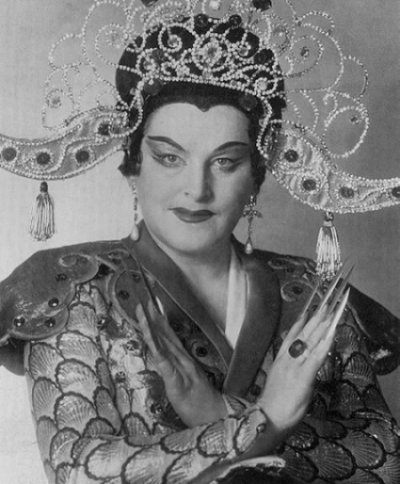 BN: It was Turandot - that was over 300 times. I don't think it's a very interesting role, but it's a challenge to sing it vocally. I wouldn't recommend anyone else to sing it as often as I did because it is the most dangerous opera to sing for the voice. It lies constantly so high, and you have to sing with a penetrating voice to survive. You can kill yourself if you don't know every moment what you are doing. You must be warmed up very, very well.
BN: It was Turandot - that was over 300 times. I don't think it's a very interesting role, but it's a challenge to sing it vocally. I wouldn't recommend anyone else to sing it as often as I did because it is the most dangerous opera to sing for the voice. It lies constantly so high, and you have to sing with a penetrating voice to survive. You can kill yourself if you don't know every moment what you are doing. You must be warmed up very, very well.
BD: So for you, it was as difficult as Brünnhilde?
BN: It was shorter, but more difficult.
BD: Let me ask a tricky question - in opera, where is the balance between the music and the drama?
BN: It depends which opera you mean. You cannot emphasize the drama so much in a Mozart opera. But Isolde, which I sang 208 times, has so many dimensions that you can dig and dig and dig and I never got everything out of her. I acted her in many ways, depending on my own mood. Sometimes I felt she should be much more in love and the love should be all-encompassing. Other nights I would feel the revenge more, or I'd be hit by the destiny. And all those three Isoldes are all right.
BD: Is that what makes an opera great - the depth contained in the score?
BN: I cannot talk in general. There are some operas which I prefer less acting and just listen to the beautiful singing. They can be overacted and seem a bit funny. So it depends. You have to take it opera by opera.
BD: Let me ask another balance question - in opera, where is the balance between art and entertainment?
BN: I don't think you should put so much on the entertainment that the art suffers. There are operas which are very entertaining, but still, one should never forget that it's a piece of art which is produced. The balance can be very fine like a thread, but it still it must be worked out.
BD: Is singing fun?
BN: Of course singing is fun. Everyone sings when they are happy - I'm sure you do, too, sometimes. The birds are singing when they are busy building their nests and having their family, and if they were not happy, they would not sing. And it's the same with human beings. On the other hand, when you are a professional singer, it cannot only be fun because there are so many things to think about and everything has to be perfect. It's like making and serving a meal in a restaurant - the guests should be satisfied, too. Most of the time, one cannot enjoy one's efforts as much as one wants. Even the chef in the kitchen cannot enjoy the good meal he's serving to the guests in the restaurant.
BD: So you feel a great responsibility to your audience.
BN: Absolutely. If I didn't feel that, I would have done many things differently. For instance, I would not have taken things so seriously, and would have canceled when I felt like it. We have to be inspired and have the discipline to give something of this art - and entertainment as you say - at the appointed times. A writer or painter can work when they feel the inspiration. A singer can awaken in the morning with a headache and feel very bad, and you'll be nervous and everything is against you, but you have to regain the strength for the performance that night. It's a very tough feeling. The more responsibility you feel, the more nervous and impossible you get. At times like that, you go very early to the theater and try little by little to get in shape. And most of the time those troubles are forgotten when you are onstage, and that's wonderful. I guess it's like giving birth to a child - when the child is there in your arms, it's wonderful and you forget the pain of before.
* * * * *
BD: Do you feel that opera is for everyone?
BN: Absolutely. Why shouldn't it be for everyone'? In our days, life is so hectic and people don't want to prepare themselves; they want to have everything served on the table. They don't want to read anything before they go to the opera. If they would be a little bit more prepared, they would enjoy it even more. People come from the office, and sometimes arrive late. I've heard in the audience people saying to one another, "What is all this about?"
BD: Have you seen this new gimmick of supertitles in the theater?
BN: I don't like it. It's not fair to the singers. The audience will follow the text and listen to the music, but their eyes are up on the screen. And if the text doesn't come at the right time, there is laughter at the wrong moment. When I sing, I try to put some emphasis and meaning the words, to do some phrasing, to make a nice line, and that will get lost. I can understand it for newcomers to the opera, but I don't think they will get closer that way.
BD: How do you feel about opera in translation?
BN: I don't care very much for that, either. I think the opera is best in the original language. It is meant to be that way, and as soon as you translate it, you get wrong dynamics and wrong expressions. And, how much do you really understand of the words in English? You must be prepared and know a bit of what's going on. You are right if you say the supertitles help the audience, but I still think it's an insult to the singers because they are really not paid attention to. You can get away with less-good singers with the titles, but then the public will never hear the best.
BD: Are the operas of Wagner too long?
BN: Don’t ask me. I think they are pretty long for our public today. It can be tough, maybe, but I've heard so many people who told me they didn’t think they would be able to sit through one, but they got so fascinated with it and became Wagnerians. Of course, if it's badly produced, the music can drag and it will be very boring. That depends on the conductor, and if he can put life to every note, the public is there. If it's interesting, no opera is too long.
BD: The role of Brünnhilde - is it different operas, or one unified work?
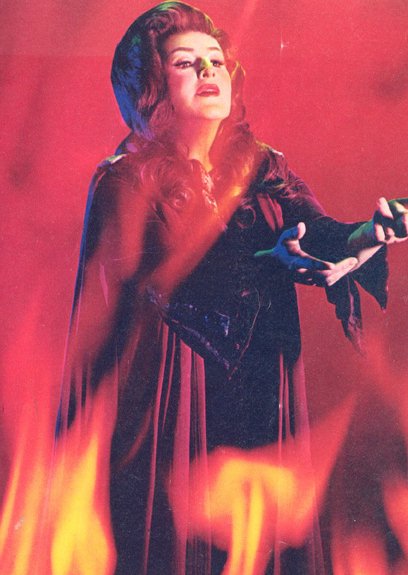 BN: Well, it continues. She is a goddess in Walküre, then in Siegfried she wakes up to be motherly toward him and falls in love. That one is very short but very difficult. She has to portray three different women - the goddess, the mother, and the loving woman. It's a very static part - you cannot really act very much without looking a little bit funny. The bigger a part is, the less you need to act it out. Wieland Wagner asked me if I thought I was competing with the wonderful music. I've been thinking of that a lot, and I think it is right. The more one acts and the more one tries to become an interesting actor or actress, the smaller the role gets in Wagner. Then, to continue with the Ring, in Götterdämmerung, she starts out as a loving woman and later becomes the betrayed woman. Then she becomes the revenging woman who wants only the one thing, the death of Siegfried. Then in the last act she is almost a goddess again. She sees everything from above. She sees what has happened and wants a new Valhall, and everything from the awful, cheap world goes into the fire. At that point, I would think she turns again into a goddess. Of course the part of Brünnhilde continues, but it has so many different sides. It is interesting, it is difficult, it is also something one can work a whole life without coming to the end.
BN: Well, it continues. She is a goddess in Walküre, then in Siegfried she wakes up to be motherly toward him and falls in love. That one is very short but very difficult. She has to portray three different women - the goddess, the mother, and the loving woman. It's a very static part - you cannot really act very much without looking a little bit funny. The bigger a part is, the less you need to act it out. Wieland Wagner asked me if I thought I was competing with the wonderful music. I've been thinking of that a lot, and I think it is right. The more one acts and the more one tries to become an interesting actor or actress, the smaller the role gets in Wagner. Then, to continue with the Ring, in Götterdämmerung, she starts out as a loving woman and later becomes the betrayed woman. Then she becomes the revenging woman who wants only the one thing, the death of Siegfried. Then in the last act she is almost a goddess again. She sees everything from above. She sees what has happened and wants a new Valhall, and everything from the awful, cheap world goes into the fire. At that point, I would think she turns again into a goddess. Of course the part of Brünnhilde continues, but it has so many different sides. It is interesting, it is difficult, it is also something one can work a whole life without coming to the end.
BD: If Siegfried had not fallen into the hands of Hagen, could Siegfried and Brünnhilde been happy for a long time?
BN: (laughing) Oh, oh, I don't know. It would be lovely to have wishful thinkings, but I'm not sure they would live happy ever after. They are very temperamental and grand people. Siegfried was very much for being out and doing wild things, and Brünnhilde was similar on her side, too. I'm not too sure she would have been happy sitting quietly at the table every evening. I think it almost would have been the same as in the Wagner family... (laughter) ...always something going on, never a dull moment.
BD: I want to ask about Tannhäuser. You sang both roles in one performance - is that a good idea?
BN: Why not? I think it's an interesting idea. I think it's very often that a man sees two sides in a woman. He wants the woman he can look up to like Elisabeth, and on the other side he wants the erotic side of the woman. These two different ideas are going through Tannhäuser's mind. Sometimes he looks for the “holy virgin” and other times he looks for the more sinful woman, which is Venus. I don't know if Wagner had it in his mind that it could be done by the same woman. Wieland was the first one, I think, who got the idea. I dreamt of singing Elisabeth all my life, but when I got to sing it I really wasn't happy with her. I didn't think I could do justice to the character. I felt I was just acting, I felt a little dull. I couldn't face her. But, when I started to sing Venus, she took on another dimension. It was much easier, and I felt much more at home when I sang both roles. And they are short roles - to sing them is absolutely nothing, like one act of Tristan, or of Götterdämmerung. It's not a big challenge that way. Some directors want it that way, and some not, but I can only say for myself that I was more happy that way.
BD: Was there any role that you sang which was very close to the real Birgit Nilsson?
BN: (laughing) I don't know. I didn't do Fanciulla del West. As you know, I was a farmer girl from the beginning. I always felt more at home to do dramatic parts, with something to bite into, than to sing lyric parts and be quiet and romantic. I felt nervous with those and was uncomfortable. But I don't go around privately having heads on a silver plate. . . . . (laughter)
BD: Let me thank you for spending some time with me this evening, and also for all that you've given the world throughout your long career.
BN: Oh thank you. It has been fun.
~ ~ ~ ~ ~
The Birgit Nilsson Prize was established in 1988 on the occasion of the 350th Anniversary of New Sweden, the first Swedish settlement in the United States. It was endowed through the proceeds of a Gala Concert in April 1988, honoring Birgit Nilsson, the legendary Swedish soprano. Winners of the prize have been Ben Heppner, Alan Held, Earle Patriarco, and Christine Goerke. Miss Nilsson personally chaired several of the competitions. For more information, visit their webpage .
=== === === === ===
--- --- ---
=== === === === ===
© 1988 Bruce Duffie
This interview was held on the telephone on April 20, 1988. Portions of the interview, along with musical recordings, were used onWNIBseveral times thereafter. A portion was also used by Lyric Opera of Chicago as part of a series featuring their Jubilarianson their website in 2004-5, celebrating the 50th anniversary of the company. This transcription was made in 1989, and was published that year in Wagner News, the regular newsletter of the Wagner Society of America, in their Summer Edition. It was posted on this website in February, 2007.
Award - winning broadcaster Bruce Duffie was with WNIB, Classical 97 in Chicago from 1975 until its final moment as a classical station in February of 2001. His interviews have also appeared in various magazines and journals since 1980, and he now continues his broadcast series on WNUR-FM, as well as on Contemporary Classical Internet Radio.
You are invited to visit his websitefor more information about his work, including selected transcripts of other interviews, plus a full list of his guests. He would also like to call your attention to the photos and information about his grandfather, who was a pioneer in the automotive field more than a century ago. You may also send him E-Mailwith comments, questions and suggestions.